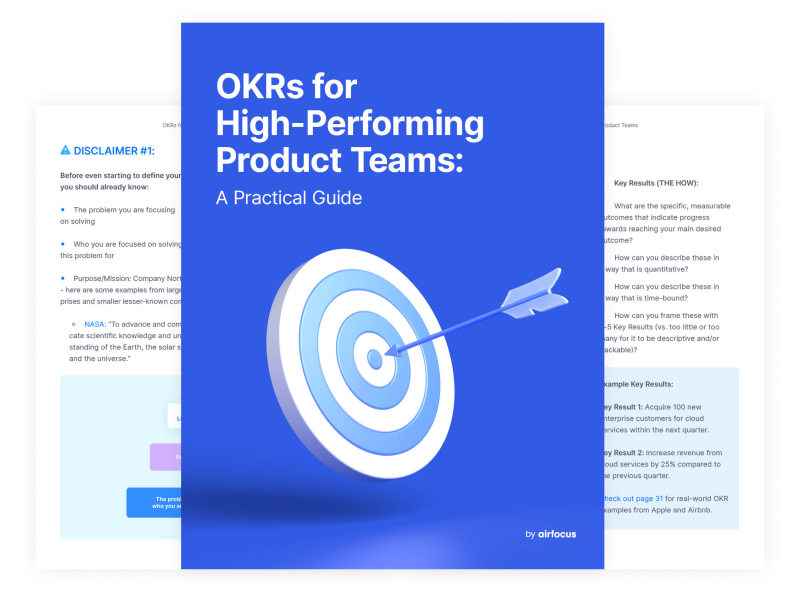
Product strategy is the cornerstone of product management.
A key part of product strategy is ensuring that the product strategy aligns with the business strategy. With this, the objectives set for the product must assist the business in reaching its objectives.
A top-down and bottom-up approach.
There are many ways in which product teams set and measure objectives. Objectives and Key Results, commonly known as OKRs, is one of the most popular and widely used by leading tech companies.
However, it has its drawbacks, and other product objective frameworks may work better for your product and teams.
This article will cover:
What are OKRs
The benefits and drawbacks of OKRs
3 popular product objectives setting frameworks
The tool to use to set and measure objectives with your team
Let’s dive deeper.
Objectives and key results
Objectives and Key Results (OKRs) is a goal-setting framework used by product teams and businesses to align performance with overarching business objectives.
Objectives represent broad, ambitious goals to be accomplished, such as striving to become the leading product in your industry.
These objectives signify clear targets to reach.
Key results play a crucial role in measuring the progress toward achieving objectives.
For example, a 10% increase in customer retention by the end of the quarter.
Check out OKRs for High-Performing Product Teams: A Practical Guide to grasp the fundamental principles of OKRs and acquire the skills and insights to effectively implement them.

Some of the leading companies that employ OKRs include Google, Microsoft, Adobe, LinkedIn, and more.
Benefits of OKRs
Here are some of the key benefits of OKRs.
1. Team alignment on priorities
Implementing OKRs ensures that everyone on your team is aware of the specific objectives for the time period, alongside the company's main goals. This clarity removes ambiguity around priorities.
2. Company alignment
Effective implementation of OKRs ensures that team and product objectives align with the overarching company OKRs, and vice versa. This creates a connected structure where all initiatives are interrelated.
3. Outcome focused
OKRs inherently steer teams toward an outcome-focused approach rather than concentrating solely on outputs. This approach keeps the focus on achieving specific outcomes, which has a positive influence on decision-making.
4. Systematic approach to success
When applied correctly, OKRs drive companies, teams, and products forward. Each member of the company works collaboratively to achieve the OKRs and moves the company towards success.

Drawbacks of OKRs
Though popular and widely employed, this framework does have a few drawbacks.
1. Unrealistic goals
With OKRs some teams push themselves too far, and while aiming to set goals that are ambitious and key results that stretch them, they end up creating unrealistic objectives and targets.
Done consistently, constantly unmet objectives leads to lower team morale. There is no benefit of repeatedly setting OKRs when your team continues to miss targets.
2. Challenging in rapidly changing market conditions
Setting OKRs is easier in a stable market with predictable conditions. In a hyper competitive market with rapidly evolving conditions however, setting OKRs is more difficult as the OKRs set at the beginning of the quarter may not be applicable a quarter later.
In this scenario it is beneficial to have an adaptive approach to match the rapidly changing conditions and ensure that the OKRs remain relevant.
3. Competition among teams
OKRs are meant to be transparent, with all teams aware of the OKRs of other teams. One side effect of this is that it can lead to competition.
When OKRs are tied to performance and bonuses teams may focus on ensuring that their OKRs are met while giving minimal importance to the needs of other teams to accomplish their objectives. It is near impossible for product teams, actually for any team, to accomplish their OKRs without collaborating with other stakeholders.
4. Prescriptive approach
If individuals are not involved in the process they may feel separated from the objectives and tactics to accomplish them. This can lead to decreased motivation as members will not exert much effort to accomplish the OKRs.
Also, prescriptive OKRs do not leave room for teams to find innovative ways to accomplish objectives.

3 alternative product objective frameworks
While OKRs have their merits, there are other product objective frameworks that may work better for your team. Here are 3 popular ones to be aware of.
1. V2MOM
Marc Benioff, the co-founder and CEO of Salesforce, developed this framework to set annual goals for the company.
Each year he creates a new V2MOM and shares it with the company while encouraging employees to share theirs.
This acronym stands for Vision, Values, Methods, Obstacles, and Measurements.
Vision: what do you want to accomplish?
Values: why is this important?
Methods: how will you actualize the vision?
Obstacles: what challenges are in the way?
Measurements: how will you know when the vision is achieved?
Check out Marc’s article on Salesforce’s blog to learn more about this framework.
2. BHAG
In the popular business book Built to Last, Jim Collins introduced BHAG and outlines that this is one of the key things that sets the most successful companies apart from the mediocre ones, a Big Hairy Audacious Goal.
BHAG’s stretch companies to accomplish great things, unify and rally them behind ambitious initiatives, and enables them to accomplish victories along the way.
President John F. Kennedy set a BHAG in 1961 to land man on the moon before the end of the decade. A BHAG which was accomplished by NASA in 1969!
Check out Jim Collins article on his blog to learn more about this objectives setting framework.
3. SMART
One of the key reasons why goals don’t get accomplished is because they lack the key ingredients for success. This framework embeds these ingredients within them so that failure is minimized.
Developed in 1981 by George Doran, Arhur Miller, and James Cunningham, this acronym stands for Specific, Measurable, Attainable, Realistic, and Timely.
Specific: concrete definition of the goal
Measurable: measure whether the goal is achieved
Attainable: not very easy to achieve, but also slightly challenging
Realistic: ensure that you can actually accomplish the goal given the current conditions
Timely: the deadline to accomplish the goal
Check out this article written in 1981 by George Doran where he initially introduces this framework and discusses it in detail.
airfocus Objectives app
Irrespective of which product objective framework you follow, leveraging the right tool makes the entire process easier.
This is where the airfocus Objectives app plays a role, a powerful addition to airfocus’ product management platform, designed to enhance the strategic alignment and execution of product objectives.
Some of the key benefits of this app include:
Manage your OKRs in airfocus and connect them to your roadmaps and workflows. Get all of your product artifacts in one place to understand your teams' progress across all levels – from a single user story all the way up to your long-term company objectives.
Link your airfocus items such as initiatives, epics, or tasks, to key results to ensure the day-to-day product work contributes to the overall strategy.
Submit regular check-ins to get real-time context of your progress, helping you spot at-risk objectives and make timely adjustments.
Build organizational transparency and increase trust among teams. Help individual team members understand how their work contributes to the company's overall success by making OKRs widely accessible.
Flexible configuration: Track your goals regardless of what process or framework you use. Benefit from airfocus' flexibility by customizing objective hierarchies, time periods, views, and fields to reflect how you plan and work.
Product teams around the globe trust airfocus to be their product operating system. Book a demo here.
Conclusion
OKRs is one of the most popular product objectives setting frameworks, and rightfully so. Used by leading product companies, it enables transparency, ties strategy to execution, and ensures alignment among stakeholders.
However, it has its drawbacks. Consider some of the other popular product objectives setting frameworks mentioned here such as V2MOM, BHAG, and SMART.
Irrespective of the framework you use, leverage the right tool to support your product management practice.
airfocus’ Objectives & OKRs app ensures that strategy is embedded in your product setup with an easy way to track and collaborate on goals with transparent results that hold stakeholders accountable.

Quadri Oshibotu

Read also


Create effective product strategy

Experience the new way of doing product management





